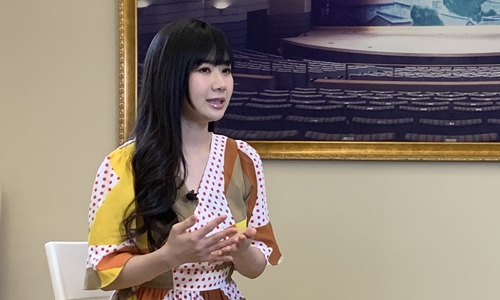HOME >> SPORTS
Mission continues
By Lu Wenao and Xing Xiaojing Source:Global Times Published: 2019/12/15 18:53:39
Japanese table tennis icon Fukuhara vows to contribute, rules out becoming a coach

Japanese table tennis star Ai Fukuhara Photo: Lu Wenao/GT
For many retired table tennis athletes, picking up a coach career would be an option. But this is not Japanese star Ai Fukuhara's post-playing-days plan."I don't think I am suitable to be a coach," Fukuhara told Global Times in fluent Chinese on the sidelines of the China-Japan Youth Envoy Salon last week.
"I'm a softhearted person ... Having known the pains of being an athlete, I think I would let my players rest too much."
Though she has never won gold medal during her glittering 25-year career thanks to Chinese dominance in the sport, Fukuhara rose to fame as her adorable appearance earned her the Chinese nickname "Porcelain Doll."
Fukuhara married Chinese Tapei table tennis player Chiang Hung-chieh following the Rio de Janeiro Summer Olympics in 2016. The couple has two children.
"I won't force them [my children] to play table tennis. It is just an option among many other sports," Fukuhara said. "But if they decide to pick up the paddle, they will have my full support."
Fukuhara began playing table tennis at the age of 3 and started to compete at 10.
Working with her coach from Northeast China's Liaoning Province, she learned to speak fluent Chinese but with a strong Northeast China accent.
Opponents, also friends
Even after training for years in China, where table tennis is one of the most popular sports, wasn't enough to help Fukuhara overthrow elite Chinese athletes.
Wang Nan, then Zhang Yining, both four-time Olympic gold medalists, and Liu Shiwen, a multiple world champion, kept Fukuhara from earning a singles' gold medal.
Fukuhara's stints in China helped make her Japanese name "Ai Chan" popular in China, even though she was often seen in tears after losing matches against Chinese opponents.
"I was not crying because I lost," Fukuhara said. "I didn't perform up to my expectations and I had failed those who support me, that's why I was in tears."
Outside of the competition, Fukuhara has befriended many Chinese table tennis stars.
"After Wang gifted me a little fish doll for good luck, I wished not to draw her in the competition and I didn't," Fukuhara said. "But I was then unlucky as I always got in the same half as Zhang."
Contribution to table tennis
Fukuhara retired in October 2018 after the rise of Japan's younger players on its national team squad including Kasumi Ishikawa who is four years younger and Mima Ito who is 12 years younger.
"At that time I think my mission [to inspire more people to watch table tennis] had to be carried on by the younger generation. That's why I was hesitating on whether to go on playing or not," Fukuhara said of her retirement. "I have never hated table tennis."
"I have been playing table tennis for over 25 years, I can't imagine not doing something connected to it," said Fukuhara. "It's just time for me to move on to my next mission, to contribute back to table tennis."
As Tokyo will host the Summer Olympic Games next year, Fukuhara has vowed to do promotional work for the Games, and wants to inspire more people to participate in table tennis.
The idea of dethroning China's reign as champions has been simmering, as the Japanese team eyes glory on home soil.
"I hope they [both Chinese and Japanese players] perform at their best level during the Olympics," Fukuhara said.
"It's a competitive sport but I want all of them to walk out of the arena with a smile on their face, leaving no regrets."
RELATED ARTICLES: